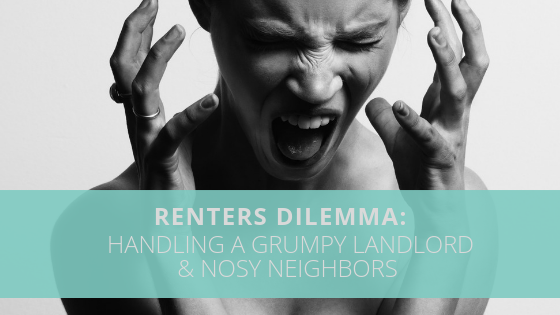Are you dealing with a grumpy landlord or nosy neighbors?
It could happen to anyone.
When you signed your lease, you had no idea that the landlord would be so difficult. Similarly, the neighbors didn’t seem too invasive.
However, you’re now stuck in a lease dealing with a landlord you’re not too fond of and neighbors who won’t mind their own business.
What can you do?
Below are steps to take to protect yourself and your privacy from your landlord and neighbors.
Document Everything
If you have a dispute with a neighbor or landlord, it is vital to document everything that takes place.
After every conversation, take the time to write down exactly what you discussed. Also, consider sending a summary document to your landlord or neighbor, so they have the opportunity to respond. If the dispute doesn’t get handled and you need to take further action, you’ll have evidence that supports your side.
Writing down what both parties said is a good idea, but it’s an even better idea to only communicate in writing. Writing an email or letter gives you a paper trail that you can use to your advantage in the future.
If you ever have to present your case in a courtroom or in front of the HOA, these documents will protect you from any “he said, she said” argument.
Don’t take any chances and document everything.
Understand Your Rental Agreement and Rights
Do you understand your rental agreement? If you don’t, it’s time to read it over.
If there’s something you don’t understand, consult with another landlord or legal professional. It’s critical you understand everything outlined in your lease.
Understanding your agreement is essential because you need to know exactly what you are allowed to do and what you aren’t allowed to do. You don’t want to get caught up in a dispute with your landlord only to find out you are actually in the wrong.
Knowing everything about your rental agreement isn’t only helpful with landlords. If you can pinpoint a rule that your nosy neighbors are breaking, you should report it, in writing, to your landlord.
Additionally, understanding the procedure and the steps you’ll need to take to leave your apartment will make everything run more smoothly if and when you decide to move out.
In addition to understanding your rental agreement, familiarize yourself with local and federal laws regarding tenant rights. If a landlord or neighbor is mistreating you, learn more about your state’s laws on tenant rights. Tenants’ rights mostly fall under the jurisdiction of the local or state government, which means they vary from state to state.
Follow the Rules
Following the rules, as outlined in your rental agreement, is paramount during a tenant dispute.
If you break any rule in your rental agreement, you are providing your landlord with reasons to evict you.
Even when you do decide to move out it’s vital you continue to follow the rules. It’ll make the process go more smoothly and will help avoid any unnecessary move out fees.
Remember, following the rules is essential because if something goes amiss, you don’t want to provide a landlord or neighbors with ammunition. Follow the rules and things are more likely to go your way.
Pay Rent on Time
One big reason for apartment disputes is money, but if you’ve been paying rent on time and doing everything else by the book, then you shouldn’t worry.
To ensure you’re paying on time set up automatic payments so that forgetting to pay will never happen.
And, in accordance with our first guideline, make sure to document when your payments were submitted. You’ll want a detailed record of any payments in case your landlord makes a false claim that you never paid.
Connect With Your Neighbors
If you’re dealing your a lousy landlord or nosy neighbors, connect with fellow community members. Your neighbors (not the nosy ones), the HOA, and even mediators can help with disputes.
If you feel comfortable doing so, discuss the issues you’re having with your landlord with fellow tenants. If they’re having the same problems, then a larger conversation is probably necessary.
Likewise, if you’re having issues with a neighbor, check with other tenants to see if they’re having the same problem. If the situation gets out of hand, you can bring the issues up to the landlord or the HOA.
Another idea is to hire a mediator which enables both parties to present their case to a neutral person before spending money on legal services. A mediator may provide a new perspective which can potentially handle the dispute for both parties.
Do Some Self-Reflection
Not everyone is blameless. If you’re being stubborn over an issue that isn’t worth your energy, try to make peace. If you find that other tenants aren’t having the same problems, it could very well be you. Figure out a positive way to resolve the issues with your landlord or neighbor without involving other tenants or legal services.
Neighbor and landlord disputes are quite common, so if a few happen to take place don’t get discouraged. Hopefully, a conflict will get resolved on its own, but if it doesn’t, you now have a good idea on what steps to take next.
No residential area is perfect. But if you can’t find a way to live peacefully, it may be time to move on to a new residence.
Author Bio:
Crescent Highland is a brand-new, mid-century inspired community conveniently located in Central Phoenix. Known for elevating Phoenix’s art culture with its colorful murals on the exterior and interior of the community. With several intimate amenities and lots of modern features, the fun begins when residents open the door to their new home.

![Survey: Nearly Half of Movers Take Months To Finish Unpacking [+ 10 Unpacking Tips]](https://moving.selfstorage.com/wp-content/uploads/2025/06/how-to-unpack-after-moving-hero.jpg)




